Does your canine companion suffer with anal gland issues? Problematic anal glands are a relatively common complaint among my patients and one of the nutritional methods I advise is to add some pumpkin to their diet.
One study has suggested that up to 12% of pooches will suffer from some anal gland complaint at some point in their life.
Pumpkin is 100% natural (once you don’t buy pumpkin pie mix or canned forms with added sweeteners) and chock-full of nutrients and fiber that helps to support your dog’s digestive health and in turn prevent anal gland issues.
All dogs have anal glands and problems can easily become chronic if any underlying issues aren’t addressed early on. Nutritional support is one of the most helpful ways I have found to prevent this from occurring – and I’m a big fan of pumpkin for my patients.
How to know if your dog has anal gland problems?
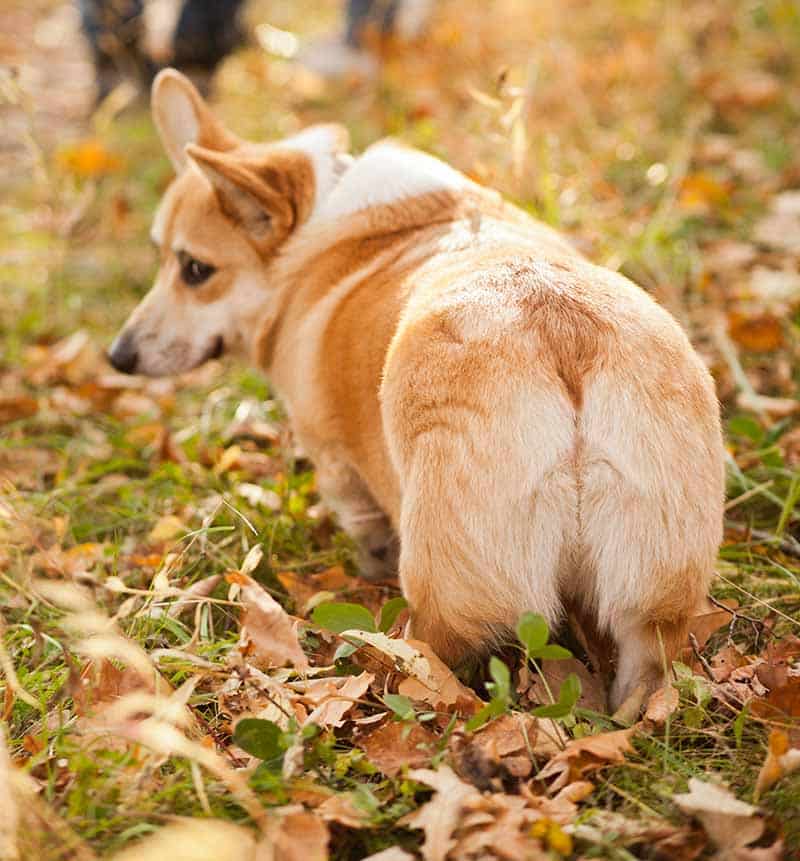
All dogs have anal glands (unless they’ve had them surgically removed) and about 10% of pooches suffer with anal gland problems. These little sacs lie at 8.00 and 4.00 on each side of your dog’s bum and their entrances are just inside the rectum. These sacs contain a stinky fluid that lubricates your pooch’s poo and also gives it a distinctive odor (hence why dog’s love to sniff each other’s poop and butts).
Signs your pooch is struggling with their anal glands include “bum scooting” (where they drag their bum along the ground), licking their bum or tail more than usual, difficulty defecating, blood/pus on their poo or swelling(s) where the sacs lie under the skin.
Why & How Pumpkin helps anal glands?
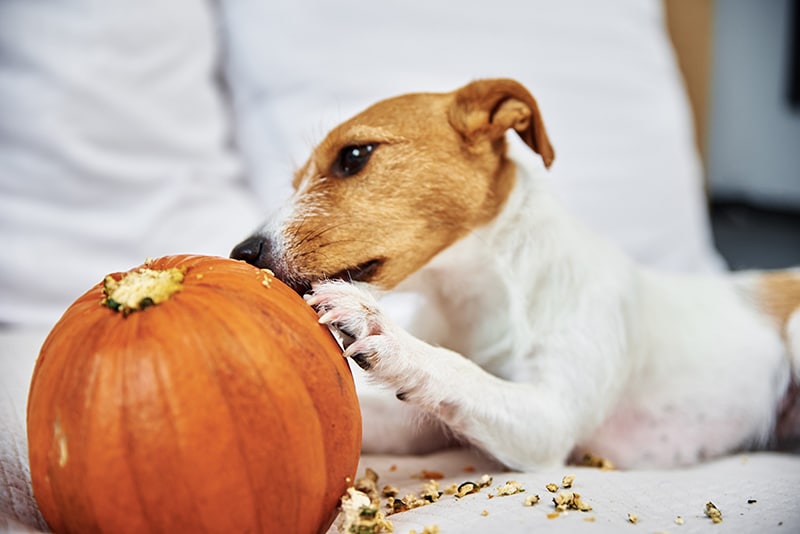
Pumpkin has long been used in herbal medicine, chock-full of unsaturated fatty acids, vitamin E, and most importantly fiber (both soluble and insoluble). What your dog eats affects the quality of their poop, high fiber diets help to bulk their stools and make them easier to pass. As your dog poops, pressure is put on their anal glands and fluid is expressed. Regular emptying of anal glands prevents inflammation.
Pumpkin’s insoluble fiber component helps to bulk your pooch’s poop, keep stools soft and easy to pass. The extra fiber will help your pup feel full which is helpful for chubby pooches that need to lose weight. Simply adding some pumpkin to your pooch’s normal food can help your pup maintain healthy stools and prevent anal gland inflammation and impaction.
What does science say?
Rich in unsaturated fatty acids and vitamin E that act as free radical scavengers and antioxidants, there is current research into pumpkin’s possible use in cancer intervention. In the dog world, there’s a lot of research into the use of pumpkin in supplements.
In just 2018, the International Journal of Veterinary and Animal Medicine published an article on a new supplement to prevent and treat anal gland disease in our furry friends (Ehrenzweig, 2018). This product is Glandex®.
Are there side effects to a pumpkin-based diet?
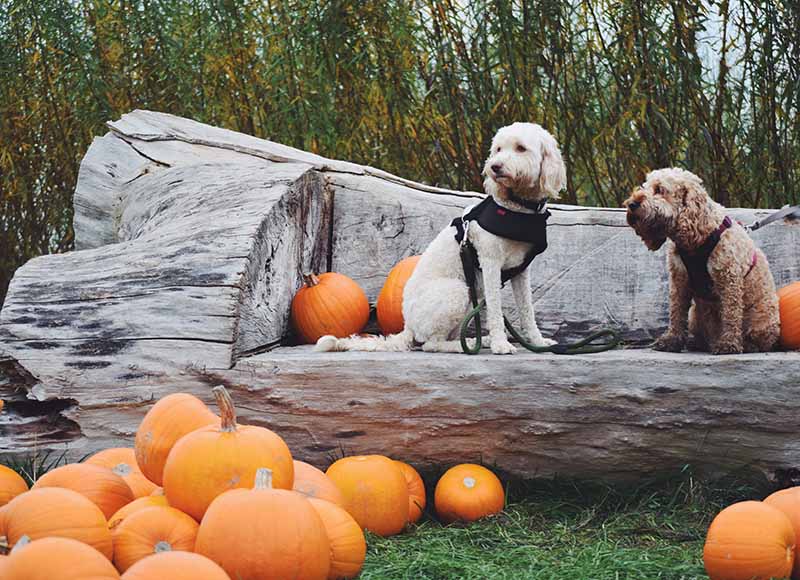
Your dog’s diet shouldn’t really be based on pumpkin, however, small amounts will help increase the fiber content in their diet which will help maintain regular bowel movements with appropriately firm poops. This superfood isn’t without its side effects so you need to get the correct dosage to prevent them from occurring. Too much fiber can actually decrease the amount of other nutrients, including protein, that your pooch can absorb from their food.
If you use canned pumpkin, make sure you use pure pumpkin and not pie filling which can be high in sugar and other dangerous additives. Another negative of canned pumpkin is that they can be high in salt which is particularly dangerous for pooches with cardiac or renal disease.
*Always consult with your veterinarian before offering your pup any supplemental foods. Your veterinarian can help you determine the right amount of pumpkin to give your pooch.
Is giving pumpkin enough for anal glands?
Unfortunately, it’s not; while pumpkin is a great addition to your dog’s diet if they suffer with digestive issues, it’s not a cure-all. Depending on the cause of your pup’s anal gland issues you may need to completely overall your pooch’s diet.
Recommended pumpkin products
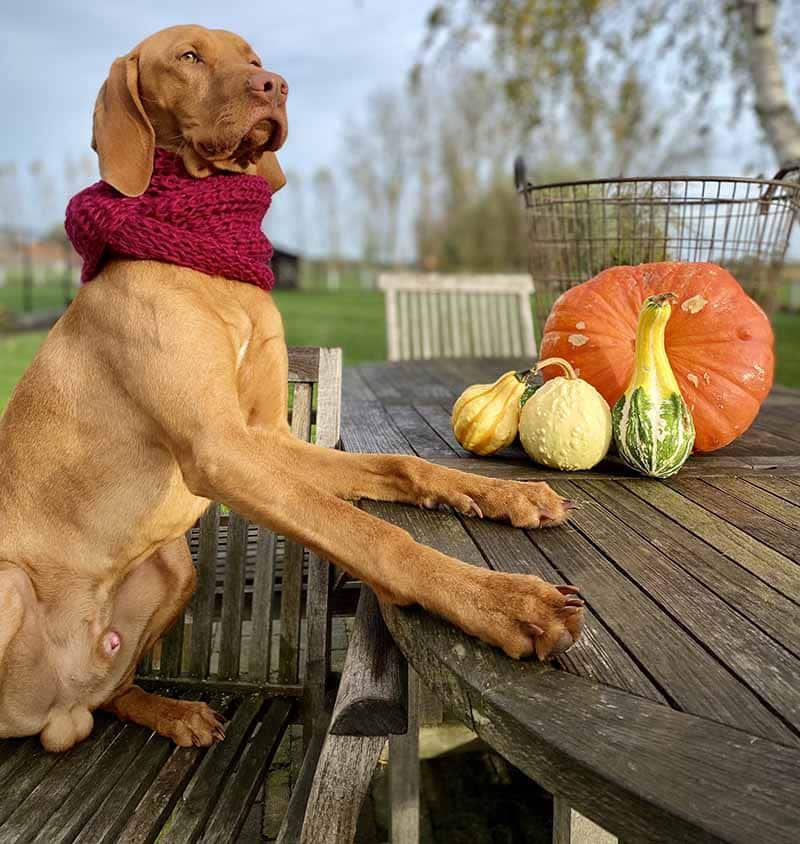
Picking a pumpkin containing food for your dog is best done in conjunction with your dvm as they can guide you toward the most suitable product for your dog’s specific needs; this is especially true if they have allergies.
There are lots of treat-based supplements and wet food toppers that you can offer your dog to support their digestive and anal gland health. We’ve put together a shortlist of our favorite products.
Vetnique Labs Glandex Peanut Butter Flavored Soft Chews
- These veterinarian-formulated chewy treats have been developed to prevent anal gland issues without needing to frequently express your pooch’s glands.
- These chews contain probiotics, digestive enzymes, and fiber from pumpkin in a yummy peanut butter flavor to help your pooch naturally express their glands.
The Honest Kitchen Pumpkin POUR OVERS Turkey & Pumpkin Stew Wet Dog Food Topper
- These delicious, slow-cooked toppers contain human-grade turkey, apples and pumpkin to add extra fiber to your dog’s diet in a delicious stew.
- Using excellent quality ingredients, this product is made in the USA without gums, fillers, artificial flavors or preservatives to provide extra support for your dog’s digestive system.
Zesty Paws Core Elements Probiotic Pumpkin Flavored Soft Chews Digestive Supplement for Dogs
- Soft chews with a base of pumpkin and papaya provide probiotics and enzymes to support your dog’s immune and digestive systems.
- These delicious bites support the good microflora in your pooch’s digestive tract to help with constipation, bloating, and indigestion which really helps dogs with anal glands.
Other ways to serve pumpkin to your dog
There are so many options for serving pumpkin to your pooch.
- Dog food – You can choose a complete and balanced canine kibble (or canned food) containing pumpkin to help your dog’s digestion.
- Supplements – There are lots of pumpkin supplements available on the market that are designed to encourage healthy poops and reduce anal gland issues in your dog.
- Pumpkin seeds – While safe, seeds aren’t necessarily the most tummy-friendly parts of the pumpkin. The best way to give your dog pumpkin seeds is to roast and then grind them.
- Home-made pumpkin – You can make some homemade pumpkin treats by either roasting or simmering the flesh.
- Pumpkin powder – Pumpkin powder supplements are basically cooked and ground pumpkin that you can mix in or sprinkle over your pooch’s kibble.
How often should I give Pumpkin to my dog for anal glands?
You can offer your fur-baby pumpkin daily. Larger pooches may be able to eat up to 4 tablespoons of pumpkin per meal while small dogs should only have a teaspoon or so per day.
Always start with small amounts at first to prevent tummy upsets and chat with your veterinarian to help determine an appropriate amount of pumpkin for your pup. Pumpkin is also relatively high in calories so large amounts are not a great choice for portly pooches.
More benefits of pumpkin to dogs

First and foremost, pumpkin supports digestion through the provision of extra fiber, fatty acids, and prebiotics that support friendly gut bacteria. We’ve listed just some of the ways pumpkin can help your dog below:
- Diarrhea/Colitis – Colitis is inflammation of the large intestine (colon) and diarrhea is a common sign of the illness in our pooches. The soluble fiber in pumpkin helps to slow the transit of food in your dog’s intestines, this is through absorbing some of the excess water and reducing the “urgency to go” that’s often associated with colitis.
- Constipation – Insoluble fiber in pumpkin also helps to improve stool quality through the stimulation of water and mucus secretion within the large intestine to alleviate constipation.
- Upset tummies – The slow absorption and low glycemic index of pumpkin can help when dog’s have indigestion/acid reflux or recent bouts of vomiting. Pumpkin won’t stop your dog from vomiting directly however.
- Anemia – While pumpkin isn’t my first choice to nutritionally support anemic dogs, it does contain B vitamins including folate (B9), thiamine (B1), and pyridoxine (B6) which are helpful in the production of red blood cells.
Other products that help with anal gland problems
Pumpkin isn’t the only treatment for fur-babies with problematic anal glands. Products containing other sources of fiber such as psyllium husk or high-fiber dog food are also helpful. Here are a couple of other products available to help your pup if they’re scooting through life with anal gland issues.
VetClassics No Scoot Anal Gland Function Support Soft Chews Dog Supplement
These soft chews contain beet pulp, flaxseed, psyllium husk and dandelion root to help support proper digestive function and relieve anal gland issues. There is also a small amount of pumpkin powder which certainly doesn’t hurt.
Purina Pro Plan Veterinary Diets FortiFlora Powder Digestive Supplement for Dogs.
Not specifically formulated for anal gland issues, I find these often help my patients who have frequent bouts of diarrhea that can lead to anal gland issues. The friendly bacteria Enterococcus faecium within this delicious beef-flavored powder is an excellent help to your dog’s intestinal microbiome.
Other Human Foods That Help Dogs Express Their Glands Naturally
In addition to pumpkin, there are several human foods that can naturally assist dogs in expressing their anal glands. These foods, rich in fiber and other essential nutrients, contribute to firmer stools which in turn aid in gland expression. Here are some key options:
- Bananas: High in fiber, vitamins B and C, potassium, and magnesium, bananas help firm up your dog’s stool.
- Sweet Potatoes: These are low in fat and rich in vitamins A and C, calcium, and omega fatty acids. They aid in reducing inflammation and firming stools.
- Apples: With fiber, pectin, antioxidants, and vitamins A and C, apples assist in absorbing moisture and firming stools.
- Green Beans: Offering dietary fiber, vitamins A and C, and essential minerals, green beans add bulk to stools.
- Carrots: A good source of fiber and beta-carotene, carrots help with stool firmness and provide a sense of fullness.
- Broccoli: High in fiber and phytonutrients, plus vitamins A, C, and D, broccoli should be fed in small portions to avoid stomach irritation.
- Leafy Greens/Lettuce: Mostly fiber and water, they assist dogs with anal gland issues.
- Berries (Strawberries/Blueberries): Packed with antioxidants and fiber, berries are a healthy treat that can aid in gland expression.
- Oatmeal: An excellent source of soluble fiber, oatmeal helps in creating firmer stools.
- Kelp: A rich source of fiber, omega fatty acids, iodine, and iron, kelp can reduce inflammation and promote firmer stools.
- Ground FlaxSeed: With antioxidants, fiber, and omega fatty acids, flaxseed promotes healthy stools and fights inflammation.
- Brown Rice: This whole grain adds fiber and vital nutrients to a dog’s diet.
- Beets/Beet Pulp: Rich in fiber and nutrients like vitamin C, calcium, and potassium, beets contribute to stool bulk and gland health.
It’s important to introduce these foods in moderation and observe your dog’s reaction. Always consult with a veterinarian before making significant changes to your dog’s diet, especially if they have specific health issues.
Common Questions From Dog Parents
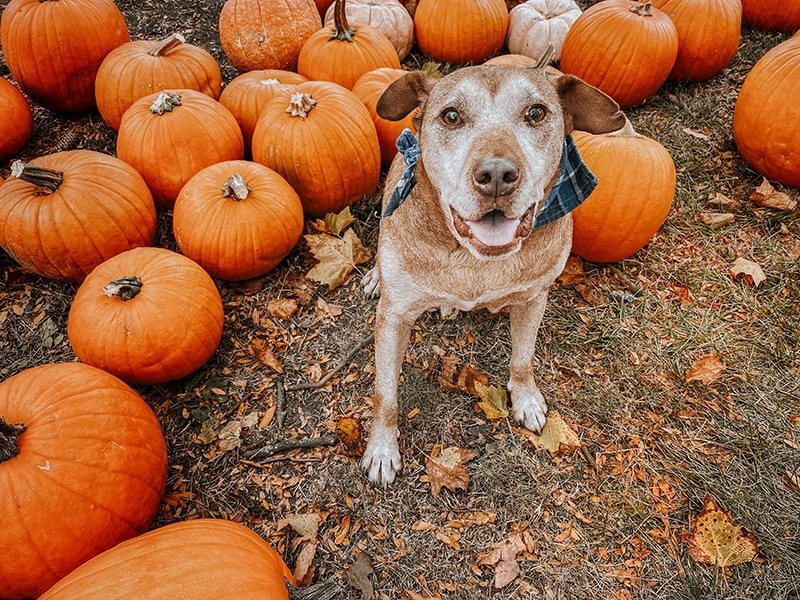
How much pumpkin should I feed my dog for anal glands?
The amount of pumpkin you should feed your dog will depend on their size and requirements. This may range from less than a teaspoon to 2-4 tablespoons per day. It’s best to discuss how much to give your dog with your veterinarian in advance.
Do vets recommend pumpkin for dogs?
Yes, I advise many of my patient’s pawrents to add pumpkin to their dog’s diet when they have tummy issues or impacted anal glands. Many of my colleagues also recommend pumpkin and it’s included in many veterinary formulated products for dog’s with anal gland issues.
Is it OK to give dogs some pumpkin everyday?
Yes, pumpkin is safe to give most dogs everyday once they have no ill effects.
Can too much pumpkin hurt a dog?
Yes, too much pumpkin can cause nutritional deficiencies due to possibly preventing absorption of some vitamins and minerals in other foods. High in calories, pumpkin may also have a negative effect on a portly pooch’s weight.
Can I give my dog canned pumpkin from the grocery store?
Yes, just make sure it’s plain pumpkin with no added sugars, sweeteners, salt or flavorings as some of these can be toxic to dogs or may negate the positive effects of pumpkin.
How long does it take a pumpkin to work on dogs?
Pumpkin is fast acting and you should see improvements within 12-24 hours if your dog is suffering with diarrhea or constipation. If you’re adding it to your dog’s food for chronic anal gland issues, it may take some time before you notice that it’s had a positive effect as this tends to be much more subtle in appearance though you’ll often see improved stool quality quickly.
Is Dickinson pumpkin safe for dogs?
No, this pumpkin product should be avoided for dogs. It’s very high in sugars (corn syrup) and has added spices and salt, all of which negate any positive effects of the pumpkin itself. It’s best to choose the least processed form of pumpkin that you can for your pooch.
Is Libby’s pumpkin safe for dogs?
Yes, this pumpkin product is safe as there are no added salts, sugars or spices etc.
Which canned pumpkin is good for dogs?
I love “Wholesome Pride All Natural Healthy Dog Treats (pumpkin flavor)” for a pure pumpkin treat for dogs. These pumpkin slices contain no additives at all and packing a fiber punch of 14% are a great way to add a little extra to your pooch’s diet.
The Final Woof

There’s no magic bullet for healing all possible causes for your dog’s anal gland concerns, and as veterinarians, we often find that a combination of nutritional changes, occasional anal glad expression (only if necessary) and sometimes medication are key. Nutrition plays a huge role in our canine companions’ health and well-being, particularly when it comes to their digestive systems.
As you can see from above, pumpkin is a nutritional powerhouse for our dogs and particularly those with anal gland issues. One point of warning is that anal gland issues are more common in obese dogs and pumpkin, while nutritious, is also high in calories so its use can be a balancing act for these pooches. Small amounts can go a long way toward helping your fur-iend have healthy poops and pain-free expression of their anal glands.
References
Beynen, A. C. (2019). Diet and anal-sac impaction in dogs. Dier-en-Arts 12 pp 312-313



Thanks for the article! Very informative!
I have a question: I started making batches of pumpkin and psyllium (1 tbsp pumpkin to 1 tsp psyllium husk). I freeze the balls and then put them in the fridge. Once they are unfrozen I feed them to my dogs once a day. My question is this ok? Am I somehow compromising the integrity of the psyllium by doing this. I’ve also read that in humans we shouldn’t eat psyllium at the same time as food b/c the additional fiber can block nutrients from absorbing. Is that the same in dogs?
Hi Marise, I’m glad you’ve found the article helpful.
It’s completely fine to freeze psyllium husk without having any real negative impact to your pet’s digestive health.
Fiber can impair the absorption of certain nutrients such as fat soluble vitamins though the degree to which this will affect your pet will depend on a range of factors.
To be safe, it’s best to offer your pooch their psyllium and pumpkin treat at least 30 minutes before or after a meal if you can.
Hi there,
I was also wondering if I can just make a pumpkin treats with yogurt? Maybe roll into a ball and freeze ?
I already make treats with natural pbutter, banana,blueberries and oats. I looked to see if these were ok ingredients, what are your thoughts?
Thank you!
Hi Michele,
Yes, you can add pumpkin to her homemade treats. Make sure it’s plain pumpkin and not one that contains sugars nor artificial sweeteners or spices.